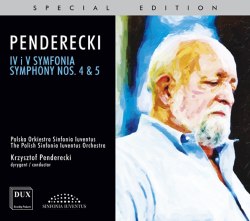| 
|
Krzysztof PENDERECKI (b. 1933)
Symphony No. 4 Adagio (1989) [30:48]
Symphony No. 5 Korean (1992) [37:59]
Polish Sinfonia Iuventas Orchestra/Krzysztof Penderecki
rec. 17 September 2010, I.J. Paderewski Pomeranian Philharmonic, Bydgoszcz (Symphony No. 4), and August and December 2011, Witold Lutoslawski Concert Studio of Polish Radio, Warsaw (Symphony No. 5).
DUX 0899 [68:35]
This live recording of Penderecki’s Fourth Symphony is in fact a re-release, originally appearing on DUX 0822 (see review). By no means priced as a CD-single, I’m glad to see that DUX has now given us greater money-per-minute value by coupling it with the Fifth Symphony.
These reviews of the DUX complete Penderecki symphonies pits the composer’s recordings against the Naxos complete set which is reviewed here. Originally to be found coupled with the Second Symphony on 8.554492, Antoni Wit’s performance agrees with the composers in timings in the Fourth which are close enough to be negligible. The live nature of the DUX recording does include a few distant coughs and bumps but nothing really distracting. This is an aspect of the composer’s version which provides a more edge of the seat experience, but ultimately this is one of those comparisons which makes it hard to come down definitively on one side or another. Both recordings and performances are very good indeed, with fine solos and superb orchestral timbre and discipline. The emotional heart of the work is in the longest movement or section, Tempo I on track 3. Here Penderecki keeps a sense of urgency in passages which can have a similar static quality to Shostakovich at his more programmatic, and this is a place in which Wit is on a slightly slower burn, hotting up later on while creating contrast with a more atmospheric opening. Which you prefer will depend on taste, but the differences are subtle enough to make both highly satisfying. This is one work in which the brass balance on the Naxos recording is equal to that on the DUX version which is arguably too forward in this case, but the potent drama of this work is superbly expressed in both performances.
The “Korean” Symphony No. 5 is a single movement work described by some as being in three ‘Acts’. The ‘Korean’ aspect of the music is a quotation from a patriotic song banned by the Japanese and symbolic of the country’s struggle for independence. Repeated notes and heavy orchestration create a sense of dramatic scale comparable with the two previous symphonies. Picking up again the comparison with Antoni Wit on Naxos 8.554567, this is one case in which I find the opening of the work more convincing from this quarter. The gong stroke on Penderecki’s recording is a bit weak and makes you wonder if you’ve acquired an earthing hum from your hi-fi, rather than the more positive ‘whoosh’ from the Polish National Radio percussionist. The low brass in this Naxos recording is also more scary than the Sinfonia Iuventas, the strings also sounding more alert and awake in the exposed counterpoint a few minutes into the work. Wit’s more propulsive tempo helps liven up the rhythms in this regard. In the end, Penderecki’s performance is very good indeed, but Wit’s pips it in too many subtle ways to make it a real winner in this race. Back to back, each moment is convincing from both conductor and Penderecki’s more spacious sounding performance won’t disappoint, but Wit’s always just sounds more involving at just about every turn. Of course, any student of these works is going to want to hear the composer’s own interpretation, but if you are more of a collector than an analytical score-tracking student then I am quite happy to recommend the cheaper option in this case.
Dominy Clements
 |
 |
|
